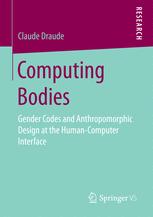

Most ebook files are in PDF format, so you can easily read them using various software such as Foxit Reader or directly on the Google Chrome browser.
Some ebook files are released by publishers in other formats such as .awz, .mobi, .epub, .fb2, etc. You may need to install specific software to read these formats on mobile/PC, such as Calibre.
Please read the tutorial at this link: https://ebookbell.com/faq
We offer FREE conversion to the popular formats you request; however, this may take some time. Therefore, right after payment, please email us, and we will try to provide the service as quickly as possible.
For some exceptional file formats or broken links (if any), please refrain from opening any disputes. Instead, email us first, and we will try to assist within a maximum of 6 hours.
EbookBell Team

4.4
42 reviewsClaude Draude analyzes embodied software agents – interface solutions that are designed to talk back and give emotional feedback – from a gender and media studies perspective. She addresses technological and sociocultural concepts in their interplay of shifting the boundary between what is considered as human and what as machine. The author discusses the technological realization of specific personality models that define the design of embodied software agents – emotion and gaze models, in particular. Finally, she explores these models in their broader cultural context by relating them to the prominent topic of the Turing test and the notion of the Uncanny Valley.